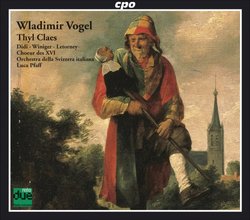| All Artists: Wladimir Vogel, Luca Pfaff, Swiss-Italian Radio Orchestra, Marie Terese Letorney Title: Wladimir Vogel: Thyl Claes Members Wishing: 0 Total Copies: 0 Label: Cpo Records Original Release Date: 1/1/2005 Re-Release Date: 10/30/2007 Genre: Classical Styles: Opera & Classical Vocal, Symphonies Number of Discs: 2 SwapaCD Credits: 2 UPC: 761203996025 |
Search - Wladimir Vogel, Luca Pfaff, Swiss-Italian Radio Orchestra :: Wladimir Vogel: Thyl Claes
 | Wladimir Vogel, Luca Pfaff, Swiss-Italian Radio Orchestra Wladimir Vogel: Thyl Claes Genre: Classical |
Larger Image |
CD Details |
CD ReviewsA tough, powerful work G.D. | Norway | 04/18/2010 (4 out of 5 stars) "Les Aventures d'Ulenspiegel by Charles de Coster might count as something of a Belgian national epic (at least according to the booklet), even though the main character and his antics was a popular myth in Germani and the Flanders long before that. Ulenspigel's adventures have of course also been depicted in music before, but Wladimir Vogel (1896-1984) based his work on de Coster's novel and not the original legends, and the novel contains a far more profound subtext and comes across as a universal warning against fanaticism and oppression; certainly Vogel doesn't focus on the impish and playful side of the character. He composed the first part, Oppression, from 1937 to 1939, it was subsequently lost during the war and reconstructed by the composer in 1942. The second part, Liberation, was completed in 1945, but - importantly - what we have on this recording is the first part; the complete work is rather long, but it might be hoped that CPO follows up with the remainder. It is scored for two narrators, soprano, speaking chorus and orchestra.
It does certainly not make for easy listening. Much of the musical material is given to the speaking chorus (!), which is used contrapuntally with much emphasis on speech rhythms and words being contrasted and placed on top of each other, often also used as counterpoint to the narrators. But much of the effect is apparently lost to one, like me, who doesn't speak Flemish (regardless of the fact that text and translation are available). The music is darkly, expressivist 20th century, mostly atonal but with a very individual twist to it in a manner analogous (though not at all similar to) the approach by Roberto Gerhard or Frank Martin. It is certainly ominously stirring and captivatingly dramatic with few touches of humor or the main character's impish side being depicted (the effective Damme Fair section is the exception and the only place where the musical textures approach any kind of lightness). There are, however, scenes of tender beauty in here, especially the lyrical Chaconne d'amour, a radiant soprano aria. Overall, however, the music is mainly chilling and grotesque, and the twists and turns of the story are mostly dark, even gruesome. While Vogel's mastery, skill and imagination as a composer is never in doubt, I have to say that this might not be a work that will appeal to everyone, and not only because of the language barrier. The performance is live, recorded in 1996, but is generally gripping and of very high quality; both the choral and orchestral parts are powerfully given, Letorney handles the soprano part admirably, and even the narrators are chillingly compelling. The sound quality is good as well, and this is indeed a very important release of a very important work, even though it is one that should preferably be approached with some knowledge of what one is going to experience." |
